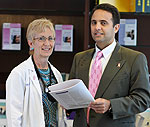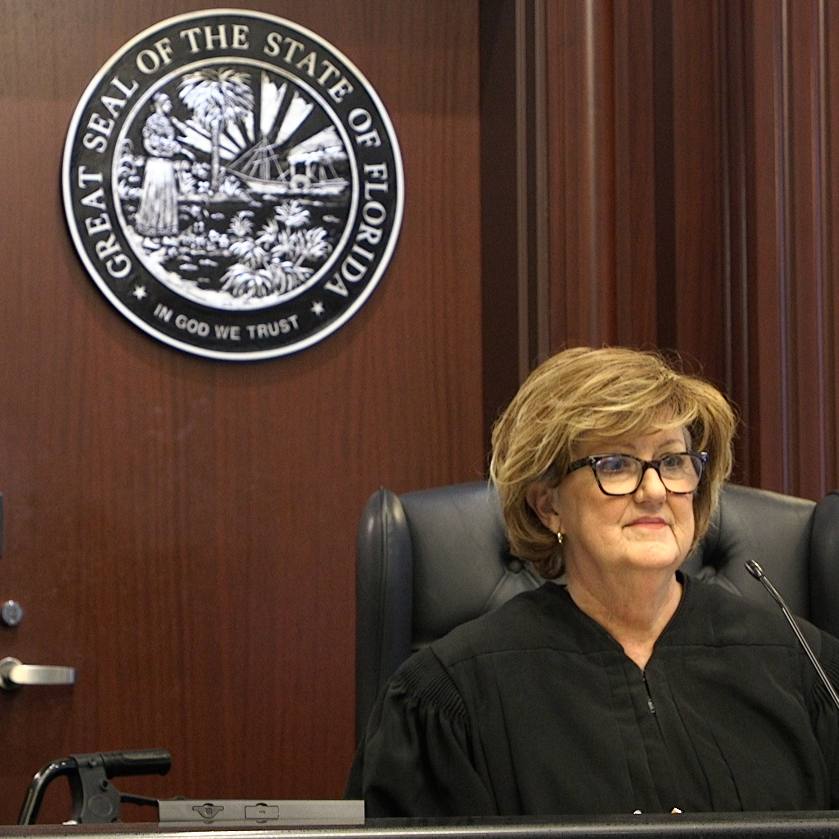Editor's note: This article is from the Winter 2009 issue of the Sharing Mayo Clinic Newsletter.
Using the measles virus and gene therapy to treat ovarian cancer
 Dixie Manley, of Cedar Falls, Iowa, was the first human to receive a reengineered measles virus to target her ovarian cancer. In July 2004, she participated in a Phase I clinical trial, receiving the virus in Mayo’s Clinical Research Unit. One of the goals of the trial was to study dosage safety and timing. Manley received six cycles of medication with very minimal side effects.
Dixie Manley, of Cedar Falls, Iowa, was the first human to receive a reengineered measles virus to target her ovarian cancer. In July 2004, she participated in a Phase I clinical trial, receiving the virus in Mayo’s Clinical Research Unit. One of the goals of the trial was to study dosage safety and timing. Manley received six cycles of medication with very minimal side effects.
“I knew from the beginning that this research might help me a great deal, or it might not help at all, but I felt that if it didn’t help me, it could possibly lead to something that might help other people,” Manley says.
Measles virus as a delivery device
The key to successful gene therapy is the delivery device, according to Stephen Russell, M.D., Ph.D., director of the Molecular Medicine Program at Mayo Clinic.
 Viruses, such as measles, are natural delivery devices and very clever about how they get inside a cell. Most viruses contain one or more gene that direct the activity of the virus. The idea behind virus therapy is to remove the original “harmful” gene — such as measles — and replace it with a different gene. One that carries a helpful message.
Viruses, such as measles, are natural delivery devices and very clever about how they get inside a cell. Most viruses contain one or more gene that direct the activity of the virus. The idea behind virus therapy is to remove the original “harmful” gene — such as measles — and replace it with a different gene. One that carries a helpful message.
The reengineered virus becomes a tiny missile programmed to target cancer cells. Once inside the cancer cell, the virus delivers its payload — a suicide message that instructs the cancer cell to self-destruct. Cancer cells are the only cells targeted by the virus, healthy cells are left alone. The major cancer fighting advantage of virotherapy is the potential to eliminate many of chemotherapy’s uncomfortable and toxic side effects.
Restructuring the measles virus
The idea of using a virus to fight cancer is not new, but the technology, facilities and equipment necessary to manufacture a gene or virus therapy pure enough to meet the Food and Drug Administration’s (FDA) standards for human use has always been a challenge. Mayo Clinic’s Molecular Medicine Program is one of the very few places in the world where clinical-grade reengineered viruses and viral vectors can be manufactured for patient use.
Kah Whye Peng, Ph.D., one of the project’s lead investigators, engineered a measles virus called MV-CEA. When studies showed that MV-CEA induced regression of 80 percent of ovarian tumors in mice, the team was ready to launch a Phase I clinical trial — the first step in studying its effect for women who have progressive ovarian cancer that has not responded to standard treatment.
Preliminary results of human studies
 “Although a Phase I clinical trial is too early in the research process to draw conclusions about the effectiveness of a treatment, there has been early evidence of biologic activity of MV-CEA in ovarian cancer patients,” says Eva Galanis, M.D., the principal investigator for the clinical trial. “The excellent tolerance is also allowing us to test higher doses of MV-CEA in this ongoing trial.
“Although a Phase I clinical trial is too early in the research process to draw conclusions about the effectiveness of a treatment, there has been early evidence of biologic activity of MV-CEA in ovarian cancer patients,” says Eva Galanis, M.D., the principal investigator for the clinical trial. “The excellent tolerance is also allowing us to test higher doses of MV-CEA in this ongoing trial.
“Recurrent ovarian cancer is a lethal disease, claiming the lives of 14,000 women every year in the United States,” Dr. Galanis says. “It’s exciting for our team to take this virotherapy approach all the way from discovery to a stage where it can help our patients.”
 Cancer treatment and clinical trials at Mayo Clinic
Cancer treatment and clinical trials at Mayo Clinic
Approximately 17,000 new cancer patients are treated at Mayo Clinic every year, making it one of the largest cancer treatment facilities in the nation. Hundreds of cancer-related clinical trials are available for patients through Mayo Clinic Cancer Center.
Mayo Clinic Cancer Center has been a National Cancer Institute (NCI)-designated cancer center since 1973. In 2003, the institution received three-site comprehensive status from the NCI for its campuses in Phoenix/ Scottsdale, Ariz., Jacksonville, Fla., and Rochester, Minn.



















